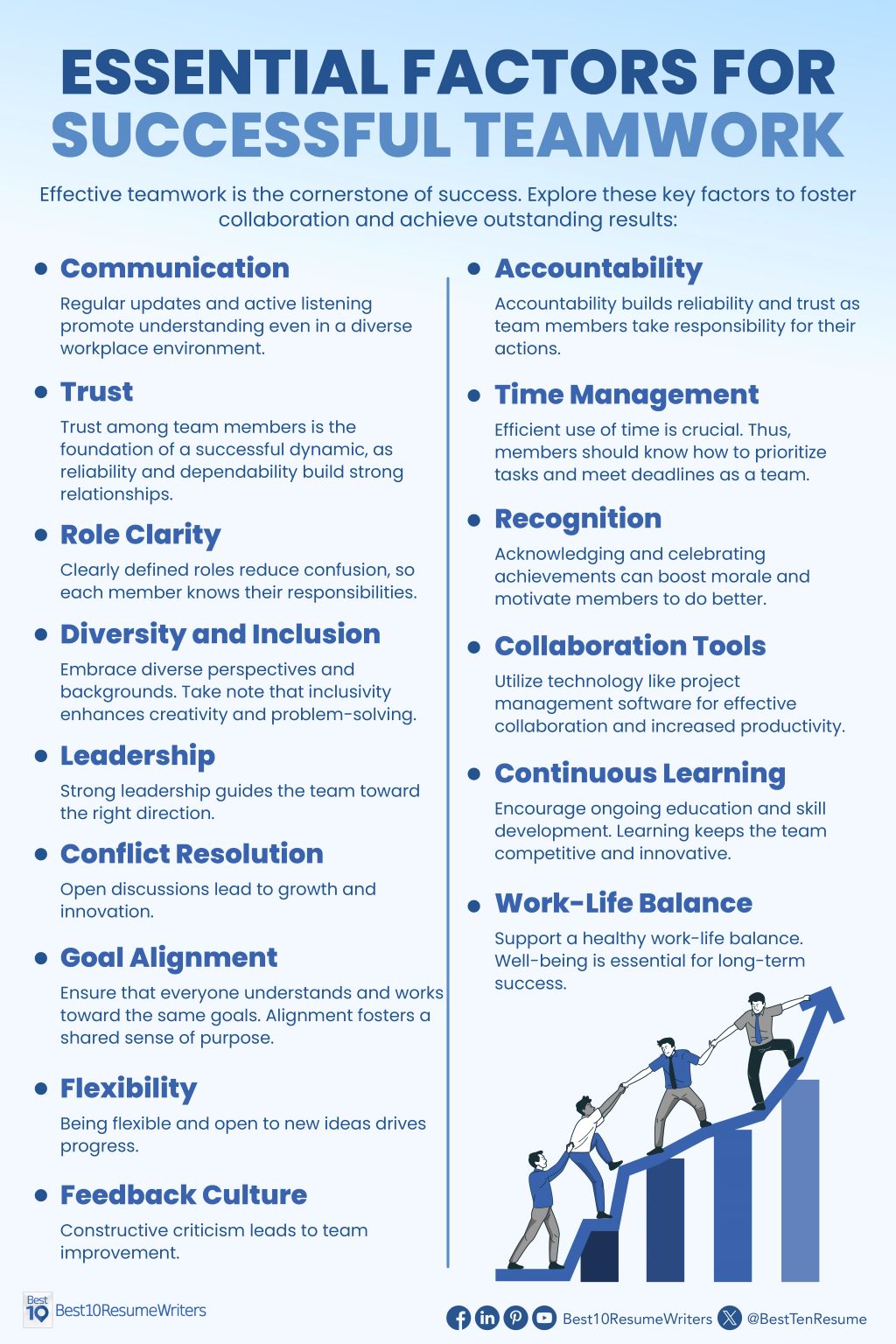Are you part of a team? If yes, do your group members know how to reach the common goal? While it seems easy to take teamwork for granted, any good organization knows that it’s among the secrets to the company’s success. The blueprint behind any organization’s success depends on the healthy working relationship among its employees. Indeed, teamwork is an integral part of a productive and successful workplace.
In this blog, we’ll discuss the important factors for teamwork that you need to know. We’ll also list a few practical tips to help you communicate your teamwork skills on your resume as among your selling points in your job hunt.
What is Teamwork in the Workplace?
Teamwork in the workplace occurs when a group of employees works together to accomplish a specific task or reach a shared goal. Collaboration of this kind can be accomplished within the same department or across departments as part of a larger organization.

Why is Effective Teamwork Important?
Management triumphs are results of teamwork in the workplace. Teamwork adds value and worth to each worker, whether they are leaders or members. Rather than working alone, teamwork in fact is vital to your workplace to yield better results. When you know how to work collaboratively with your colleagues and subordinates, you can produce better work and meet your goals. You can also help foster a more positive company culture.
In addition, teamwork in the workplace helps lessen tension and misunderstandings, encourages creativity and originality, allows risk-taking without fear of reprisals, and ensure that each team member feels appreciated for their work. Consequently, workplace satisfaction increases and retention rates drastically improves.
Important Factors for Teamwork
When teamwork is present in any group dynamic, everything operates like a well-oiled machine. This is why this tenet is considered a cornerstone of success. Below we’ve listed key factors to foster collaboration and achieve outstanding results.
- Communication: Regular updates and active listening promote understanding even in a diverse workplace environment.
- Trust: Trust within the team is the foundation of a successful dynamic, as reliability and dependability build strong relationships.
- Clarity of Responsibility: Clearly defined roles reduce confusion, so each member knows their roles well.
- Diversity and Inclusion: Embracing diverse perspectives and backgrounds encourages a more active collaboration and enhances creativity.
- Leadership: Strong leadership guides the team toward the right direction.
- Conflict Resolution: Open discussions lead to growth and innovation.
- Shared and Aligned Goals: Alignment fosters a shared sense of purpose. This ensures that everyone understands and works toward the same goals.
- Flexibility: Being flexible and open to new ideas drives progress.
- Culture of Open Feedback: Constructive criticism leads to team improvement.
- Accountability: Accountability builds reliability and trust as team members take responsibility for their actions.
- Time Management: Efficient use of time is crucial. Thus, members should know how to prioritize tasks and meet deadlines as a team.
- Recognition: Acknowledging and celebrating achievements can boost morale and motivate members to do better.
- Use of Technology: Utilize technology such as project management software for effective collaboration and increased productivity.
- Continuous Learning: Encourage ongoing education and skill development. Learning keeps the team competitive and innovative.
- Work-Life Balance: Support a healthy work-life balance. Well-being is essential for long-term success.
Here’s an infographic that encapsulates the important factors for teamwork:

Download the Infographic about the Essential Factors for a Successful Teamwork.
Tips on Achieving Successful Teamwork in the Workplace
Achieving successful teamwork in the workplace is key to fostering collaboration, enhancing productivity, and creating a positive work environment. Here are some tips to help you promote effective teamwork in the workplace:
1. Clearly define goals and objectives.
Do team members have a clear understanding of the overall goals and objectives of the team and the organization? Are their roles and responsibilities clear in a way that there are no overlaps? Clarity with the goals and objectives as well as everyone’s roles avoids confusion and ensures accountability.
2. Encourage open communication.
Foster an environment where team members feel comfortable sharing ideas, asking questions, and providing feedback. This, in turn, promotes trust and respect. All members of the team would feel valued for their contributions, regardless of their role or position.
3. Foster a positive team culture.
A positive and inclusive team culture celebrates achievements and supports each member in times of challenges. This helps boost team morale and encourages everyone to learn from failures and use them as opportunities for growth.
4. Provide adequate resources.
Does the team have necessary resources, tools, and training to perform their tasks effectively? Address any resource constraints promptly to prevent obstacles to progress.
5. Facilitate team-building activities.
Organize team-building activities to enhance relationships, trust, and collaboration among team members. These activities can be both formal, such as workshops and off-site retreats, and informal, such as team lunches or outings.
Highlighting Teamwork as a Skill in Your Resume
Many employers want their employees to work well with others to achieve team goals. This is why it’s important to convey your teamwork skills on your resume. Here’s a video that discusses practical tips in emphasizing your teamwork skills on your resume.
To sum up, when writing your resume, the following are important considerations to highlight teamwork as your skills:
- Focus your skills on the job description. Review the job description to see what specific teamwork abilities are required for the position. Then, in your resume’s profile and skill sections, emphasize the applicable skills.
- Highlight your specific role and titles. Job titles and tasks are another effective way to demonstrate your teamwork skills. Also, in doing so, don’t forget to describe your tasks using powerful action verbs that signify teamwork skills.
- Use the right keywords in your resume. Your resume’s keywords are like your secret weapons for catching hiring managers’ attention. Hence, as much as possible, utilize words and phrases relating to teamwork throughout your resume.
Team Up with Expert Resume Writers Who Can Highlight Your Teamwork Skills on Your Application
In your pursuit of a rewarding career, you have to be on the front line to take full advantage in the job search game. One way to secure a job is to make sure that your resume is well written.
Need to highlight your skills on your resume, such as leadership and teamwork? Look no further. We have prepared comprehensive lists of the best resume writing services, born out of exhaustive research. These top providers will help you with your job search, starting with your resumes and CVs.
You may head over to our methodology page to find out more about how we rank professional resume writers and firms to help job seekers like you decide on who or whom to hire. Once you’re all set, check our lists and good luck with your journey!





